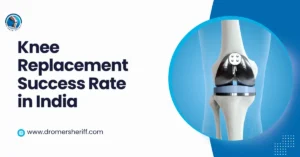Living with chronic knee pain can be debilitating, affecting every aspect of your daily life, from simple tasks like walking or climbing stairs to more significant activities like playing sports or enjoying an active lifestyle. For those suffering from severe joint issues, Joint replacement surgery can be a transformative solution. This procedure is designed to restore mobility, alleviate pain, and dramatically improve the quality of life for patients dealing with chronic knee conditions. In this blog, we’ll walk you through the benefits of joint replacement surgery, what to expect during the procedure, and how to prepare for it. We’ll also explain why finding the best joint replacement surgeon in Chennai is crucial for achieving optimal results.
What is Joint Replacement Surgery?
Joint replacement surgery is a medical procedure in which damaged joints are replaced with artificial implants to restore function and relieve pain. It is most often performed on the hips and knees, though shoulders, elbows, and ankles can also be replaced. The surgery is designed for patients who have exhausted non-surgical options such as physical therapy, lifestyle changes, or medications. A joint replacement surgery doctor in Chennai evaluates each patient’s condition to determine suitability and expected outcomes. Under the guidance of the best joint replacement surgeon in Chennai, patients often regain mobility, independence, and an improved quality of life.

Best Joint Replacement Surgeon in Chennai
Chennai is home to some of the most skilled and experienced orthopedic surgeon specializing in joint replacement surgery . These experts combine advanced surgical techniques with personalized care to deliver exceptional results. Whether it’s a knee, hip, or shoulder replacement, these surgeon provide solutions tailored to individual needs, ensuring improved mobility and quality of life. If you are seeking the leading joint replacement doctor, look no further. Let’s take a closer look at the top professionals in the field.
Dr. Omer Sheriff
Dr. Omer Sheriff is one of the leading orthopedic surgeon in Chennai, renowned for his expertise in minimally invasive knee replacement surgeries. With over 24 years of experience, he specializes in Total Knee Replacement (TKR) and Partial Knee Replacement (PKR), ensuring high success rates and improved patient mobility. Known for his compassionate care, Dr. Sheriff’s dedication to patient satisfaction and attention to detail make him a preferred choice for knee surgery.

- Specialties: Minimally Invasive Knee Replacement, TKR, PKR
- Experience: Over 24+ years in orthopedic surgeries and joint replacements
- Qualifications: MBBS, MS (Orthopedics)
Dr. Sheriff’s patient-centered approach and commitment to improving mobility through advanced surgical techniques have earned him high satisfaction ratings among his patients. For anyone considering an arthroplasty specialist in Chennai, Dr. Sheriff is an excellent choice.
What are the Types of Joint Replacement Surgeries?
There are different types of joint replacement surgeries, each tailored to specific needs:
- Total Joint Replacement: In this procedure, the entire joint is replaced with artificial components. A leading joint replacement doctor ensures precise alignment and uses minimally invasive methods to reduce recovery time.
- Partial Joint Replacement: Only the affected portion of the joint is replaced, keeping the healthy parts intact. This approach preserves natural movement while still alleviating pain.
- Revision Joint Replacement: A joint replacement surgery doctor in Chennai may recommend this when a previous implant wears out, loosens, or develops complications such as infection or instability.
- Specialized Joint Replacements: Shoulder, elbow, and ankle replacements are performed when arthritis or trauma severely limits mobility. The best doctor for joint replacement in Chennai provides tailored treatment depending on the joint involved.
Who Needs Joint Replacement Surgery?
Patients who may benefit from joint replacement surgery include:
- Chronic Arthritis Patients: Individuals with advanced osteoarthritis, rheumatoid arthritis, or other degenerative joint diseases who cannot manage pain with medications or therapies.
- People with Joint Injuries: A severe fracture or post-traumatic arthritis often leads to the need for joint replacement treatment when the bone and cartilage are too damaged to heal naturally.
- Individuals with Joint Deformities: Structural abnormalities, such as hip dysplasia or bowed legs, that hinder mobility may require intervention from the best joint replacement doctor in Chennai.
- Reduced Daily Function: Patients unable to perform simple activities like walking, climbing stairs, or even standing without pain may consult a leading joint replacement doctor for effective solutions.
What are the Advantages of Joint Replacement?
Joint replacement offers transformative benefits for individuals suffering from chronic joint pain, stiffness, and reduced mobility. By replacing damaged joints with artificial implants, this procedure restores function, reduces pain, and enhances overall quality of life. The expertise of the best joint replacement surgeon in Chennai ensures precision and lasting results.
- Pain Relief and Improved Mobility: Joint replacement effectively eliminates chronic joint pain caused by arthritis, injury, or degeneration. With the help of advanced techniques, patients experience smoother movement and increased flexibility, allowing them to return to daily activities with greater comfort.
- Enhanced Joint Function: The surgery restores joint alignment and stability, improving balance and muscle coordination. This functional improvement allows individuals to perform physical tasks and exercises that were previously difficult.
- Long-Term Durability: Modern prosthetic joints are designed to last 15–20 years or more. The skill of a joint replacement surgery doctor in Chennai ensures proper placement and alignment, maximizing implant longevity and performance.
- Improved Quality of Life: Patients often report significant improvements in sleep, emotional well-being, and independence. With reduced pain and restored motion, they regain confidence in performing both professional and recreational activities.
What are the Indications of Joint Replacement?
Joint replacement becomes necessary when joint damage severely affects daily life and conservative treatments fail to provide relief. The best doctor for joint replacement in Chennai evaluates the severity of symptoms, imaging results, and the patient’s overall health before recommending surgery.
- Severe Osteoarthritis or Rheumatoid Arthritis: These degenerative conditions cause cartilage loss, leading to bone friction, swelling, and deformity. When pain persists despite medications and therapy, replacement surgery is indicated.
- Joint Deformities or Bone Damage: Structural abnormalities or post-traumatic deformities that restrict motion or cause misalignment often require surgical correction through joint replacement.
- Persistent Pain and Limited Mobility: Patients who experience severe pain during rest or movement, along with difficulty walking or climbing stairs, are considered suitable candidates for the procedure.
- Failure of Conservative Treatments: When physiotherapy, medications, and lifestyle modifications no longer offer relief, the best joint replacement doctor in Chennai may recommend surgery for lasting improvement.
What is the Preparation for Joint Replacement?
Proper preparation for joint replacement treatment in Chennai ensures optimal surgical outcomes and faster recovery. Preoperative planning focuses on improving physical readiness, managing underlying conditions, and preparing the home environment for postoperative comfort.
- Medical Evaluation and Diagnostic Tests: Patients undergo a thorough assessment including blood tests, imaging, and cardiac evaluations to confirm surgical eligibility. The best joint replacement surgeon in Chennai reviews these results to minimize surgical risks.
- Physical Conditioning and Nutrition: Strengthening surrounding muscles through physiotherapy helps support the new joint post-surgery. A nutrient-rich diet with adequate calcium, vitamin D, and protein aids in faster healing.
- Medication Management: Patients may need to stop certain medications, like blood thinners, before surgery. Doctor also provide guidance on managing chronic conditions such as diabetes or hypertension.
- Home Preparation and Support: Rearranging furniture, installing handrails, and preparing a safe recovery area reduce fall risks after surgery. Having family or caregiver support further enhances postoperative recovery and comfort.
What are the Risks of Joint Replacement Surgery?
Joint replacement surgery is a proven and effective solution for severe joint pain and mobility issues. When performed by the best joint replacement surgeon in Chennai, the procedure is highly successful, though patients should be aware of certain potential risks and how they are carefully managed.
- Infections: Post-surgical infections are uncommon but can occur if not addressed promptly. Experienced surgeon follow strict sterilization protocols and preventive measures to significantly reduce this risk.
- Blood Clots: There is a possibility of developing blood clots in the legs or lungs after surgery. To prevent this, patients are usually prescribed blood-thinning medications and encouraged to begin early movement.
- Implant Problems: Over time, joint implants may wear out, loosen, or fail. Regular follow-up appointments help monitor implant condition and ensure long-term success of the surgery.
- Nerve or Vessel Damage: Though rare, nearby nerves or blood vessels may be affected during surgery. Skilled surgeon take advanced precautions to minimize such complications.
- Allergic Reactions: Some patients may have sensitivities to implant materials. Pre-surgical evaluations help identify allergies so that suitable implant options can be selected safely.
How Long Do Joint Replacements Last?
The lifespan of a joint replacement depends on factors such as implant material, surgical accuracy, and patient lifestyle habits. When the procedure is performed by the best joint replacement surgeon in Chennai, patients benefit from advanced surgical techniques and long-lasting implant solutions that support durability and mobility.
Long-Term Outcomes with the Best Joint Replacement Doctor in Chennai
Modern joint implants are designed to function effectively for 15–20 years or longer with proper care. Maintaining a healthy weight, following rehabilitation protocols, and avoiding high-impact activities can significantly extend implant life. Under the supervision of the best joint replacement doctor in Chennai, patients receive personalized guidance that improves long-term success rates.
Many individuals who undergo joint replacement treatment experience decades of pain-free movement and improved quality of life. With consistent follow-ups, rehabilitation support, and lifestyle counseling, patients benefit from reliable outcomes and sustained joint performance over time.
Conclusion
Joint Replacement Surgery offers immense benefits, from reducing pain to improving mobility and overall quality of life. When performed by the best joint replacement surgeon in Chennai, this procedure can provide long-lasting relief and help you regain an active, pain-free lifestyle. Whether you’re suffering from arthritis, injury-related pain, or chronic joint issues, Joint Replacement Surgery could be the solution to your struggles. If you’re ready to take the next step toward a pain-free life, Schedule a consultation with Dr. Omer Sheriff, a highly experienced Trauma Surgeon and joint replacement surgeon, with 24 years of expertise in joint replacement and sports and spine surgery.





